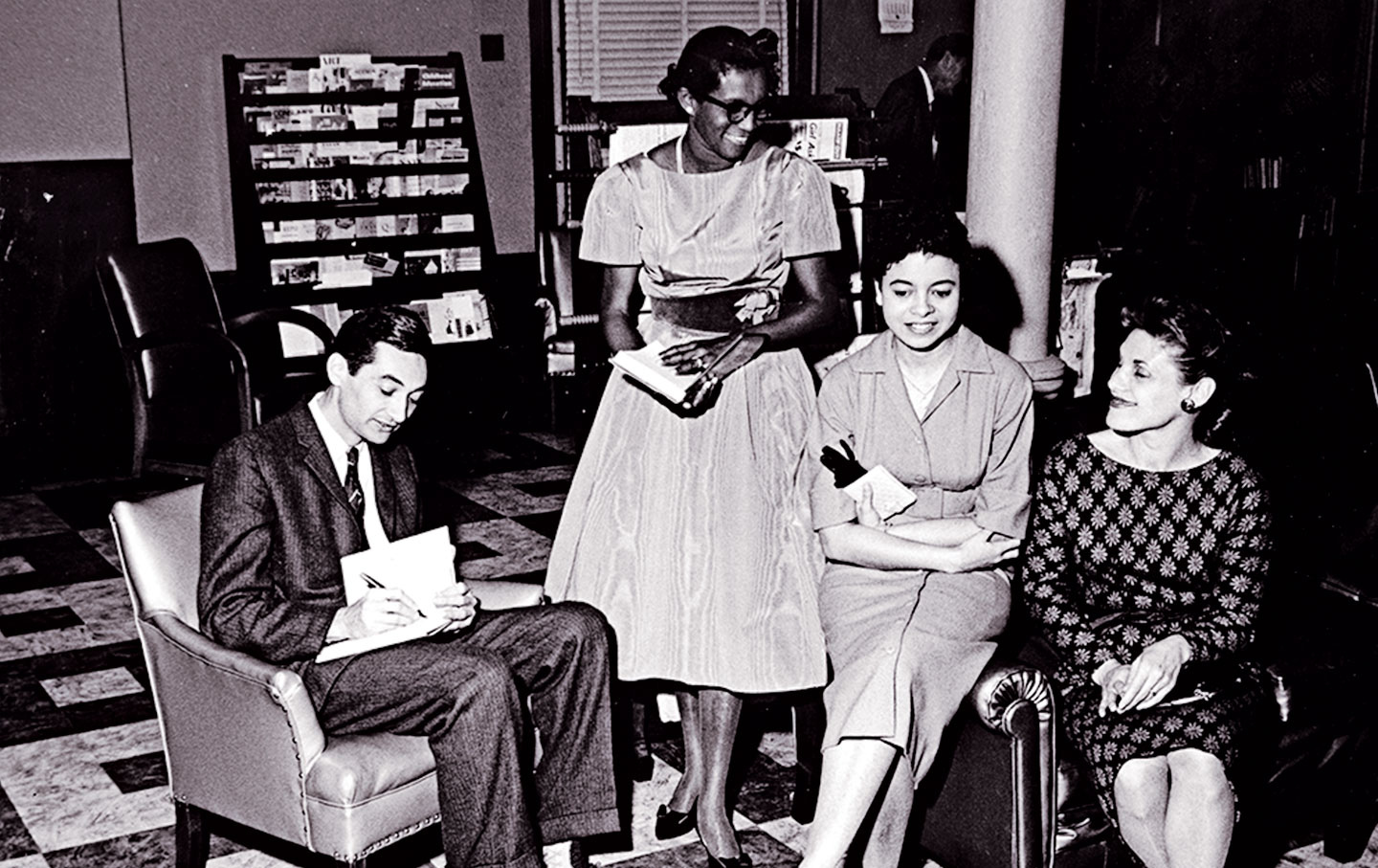
When Respectability Was No Longer Respectable, and Virtue Required Acting Out, Not Leaning In When Respectability Was No Longer Respectable, and Virtue Required Acting Out, Not Leaning In
Spelman College girls are still “nice,” but not enough to keep them from walking up and down, carrying picket signs, in front of supermarkets in the heart of Atlanta.
Mar 23, 2015 / Feature / Howard Zinn and Paula J. Giddings
Finishing School for Pickets Finishing School for Pickets
This article was originally published in the August 6, 1960 issue of The Nation. We repost it today in honor of what would have been Howard Zinn's 90th birthday. Atlanta, Ga. One quiet afternoon some weeks ago, with the dogwood on the Spelman College campus newly bloomed and the grass close-cropped and fragrant, an attractive, tawny-skinned girl crossed the lawn to her dormitory to put a notice on the bulletin board. It read: Young Ladies Who Can Picket Please Sign Below. The notice revealed, in its own quaint language, that within the dramatic revolt of Negro college students in the South today another phenomenon has been developing. This is the upsurge of the young, educated Negro woman against the generations-old advice of her elders: be nice, be well-mannered and ladylike, don't speak loudly, and don't get into trouble. On the campus of the nation's leading college for Negro young women--pious, sedate, encrusted with the traditions of gentility and moderation--these exhortations, for the first time, are being firmly rejected. Spelman College girls are still "nice" but not enough to keep them from walking up and down, carrying picket signs, in front of two supermarkets in the heart of Atlanta. They are well-mannered, but this is somewhat tempered by a recent declaration that they will use every method short of violence to end segregation. As for staying out of trouble, they were doing fine until this spring, when fourteen of them were arrested and jailed by Atlanta police. The staid New England women missionaries who helped found Spelman College back in the 1880s would probably be distressed at this turn of events, and present-day conservatives in the administration and faculty are rather upset. But respectability is no longer respectable among young Negro women attending college today. "You can always tell a Spelman girl," alumni and friends of the college have boasted for years. The "Spelman girl" walked gracefully, talked properly, went to church every Sunday, poured tea elegantly and, in general, had all the attributes of the product of a fine finishing school. If intellect and talent and social consciousness happened to develop also, they were, to an alarming extent, byproducts. This is changing. It would be an exaggeration to say: "You can always tell a Spelman girl -- she's under arrest." But the statement has a measure of truth. Spelman girls have participated strongly in all of the major actions undertaken by students of the Atlanta University Center in recent months. They have also added a few touches of their own and made white Atlanta, long proud that its nice Negro college girls were staying "in their place," take startled notice. A few weeks ago a Spelman student, riding downtown on the bus, took a seat up front. (This is still a daring maneuver, for in spite of a court decision desegregating the buses, most Negroes stay in the rear.) The bus driver muttered something unpleasant, and a white woman sitting near by waved her hand and said, "Oh, she's prob'ly goin' downtown to start another one o' them demonstrations." The reputedly sweet and gentle Spelman girls were causing trouble even before the recent wave of sit-ins cracked the wall of legalism in the structure of desegregation strategy. Three years ago, they aroused the somnolent Georgia Legislature into near-panic by attempting to sit in the white section of the gallery. They were finally shunted into the colored area, but returned for the next legislative session. This time they refused to sit segregated and remained on their feet, in a pioneering show of nonviolent resistance, until ordered out of the chamber. The massive, twelve-foot stone wall, barbed-wire fence and magnolia trees that encircle the Spelman campus have always formed a kind of chastity belt around the student body, not only confining young women to a semi-monastic life in order to uphold the ruling matriarchs' conception of Christian morality, but "protecting" the students from contact with the cruel outside world of segregation. Inside the domain of the Atlanta University Center, with its interracial faculty, occasional white students and frequent white visitors, there flourished a microcosm of the future, where racial barriers did not exist and one could almost forget this was the deep South. But this insulation, while protecting the University Center's island of integration, also kept the city of Atlanta for many years from feeling the barbed resentment of Negro students against segregation. Spelman girls, more sheltered than women at the other colleges, were among the first to leave the island and to begin causing little flurries of alarm in the segregated world outside. Even before bus segregation in the city was declared illegal, some Spelman girls rode up front and withstood the glares and threats of fellow passengers and the abuse of the bus driver. Once, a white man pulled a knife from his pocket and waved it at a Spelman sophomore sitting opposite him in a front seat. She continued to sit there until she came to her stop, and then got off. Spelman students, along with others, showed up in the main Atlanta library in sufficient numbers last year to worry the city administration into a decision to admit Negroes there. The girls spent hours between classes at the county courthouse, urging Negroes to register for voting. They made a survey of the Atlanta airport in connection with a suit to desegregate the airport restaurant, and a Spelman student took the witness stand at the trial to help win the case. Such activities may bring bewilderment to the conservative matriarchy which has played a dominant role in the college's history, but they are nothing short of infuriating to the officialdom of the State of Georgia, ensconced inside the gold-domed Capitol just a few minutes' drive from the Negro colleges of the Atlanta University Center. Georgia's bespectacled but still nearsighted Governor Vandiver, who resembles a pleasant and studious junior executive until he begins to speak, began his current burst of hysteria when student leaders at the six Negro colleges put their heads together and produced a remarkable document which was placed as a full-page ad in the Atlanta newspapers on March 9 (and reprinted by The Nation on April 2). The document, entitled "An Appeal for Human Rights," catalogued Negro grievances with irritating specificity and promised to "use every legal and nonviolent means at our disposal" to end segregation. Vandiver's reaction was immediate: the appeal was "anti-American" and "obviously not written by students." Furthermore, the Governor said: "It did not sound like it was prepared in any Georgia school or college; nor, in fact, did it read like it was written in this country." Actually, a Spelman student had written the first rough draft, and student leaders from the other five colleges collaborated in preparing the finished product. On the sixth day after publication of the appeal, at ll:30 on a Tuesday morning, several hundred students from the Atlanta University Center staged one of the South's most carefully planned and efficiently executed sit-in demonstrations at ten different eating places, including restaurants in the State Capitol, the county courthouse and City Hall. Among the demonstrators were several carloads of Spelman students, riding into town that morning without the knowledge of deans or presidents or faculty, to participate in the sitins, tangle with the police and end up in prison. Of the seventy-seven students arrested, fourteen were Spelmanites; and all but one of the fourteen were girls from the deep South, from places like Bennettsville, South Carolina; Bainbridge, Georgia; Ocala, Florida the Faulknerian small towns of traditional Negro submissiveness. The Atlanta Constitution and the Journal noted the remarkable discipline and orderliness of the demonstration. Perhaps their training came in handy; in prison, Spelman girls were perfect ladies. A Spelman honor student sat behind bars quietly reading C. S. Lewis's The Screwtape Letters, while flashbulbs popped around her. The State of Georgia, however, reacted with a special vindictiveness. To the seventy-seven sitinners, the Fulton County prosecutor has added the names of the six students who wrote and signed "An Appeal for Human Rights." All eighty-three are facing triple charges of breaching the peace, intimidating restaurant owners and refusing to leave the premises, the penalties for which add up to nine years in prison and $6,000 in fines. The use of "conspiracy" charges to tie all eighty-three students to each of the ten eating places creates a theoretical possibility of ninety-year sentences. Nothing is fantastic in this state. On May 17, to commemorate the 1954 Supreme Court decision, over a thousand students marched through downtown Atlanta to a mass meeting at the Wheat Street Baptist Church, while a hundred hastily summoned state troopers guarded the Capitol, a few blocks away with guns, billy clubs and tear gas. The students were heavily armed with books and songs, and when they were assembled in the church sang, "That Old Negro, He Ain't What He Used to Be!" What is the source of this new spirit which has angered the state administration and unsettled the old guardians of genteel passivity? There is something fundamental at work which is setting free for the first time the anger pent up in generations of quiet; well-bred Negro college women, not only at Spelman College, but at Fisk, Bennett, Alabama State and other institutions throughout the South. The same warm currents which are loosening the iceblocks of the status quo throughout the world are drifting into the South and mingling with local eddies of discontent. What has been called a global "revolution in expectations" rises also in the hearts and minds of Southern Negroes. Expanding international contacts are reaching even into small Southern colleges. The arrested Spelman girl from Bennettsville, South Carolina, spent last year studying international relations, and spent the summer in Soviet Russia. The Atlanta student who helped draft the appeal had just returned from a year of studying music in Paris. Last September, two young African women, under the auspices of the militant Tom Mboya, flew in from Kenya to enroll at Spelman. The tame-sounding phrase "cultural exchange" may have revolutionary political implications. Like many Negro campuses in the South, Spelman is losing its provincial air. This spring, the first white students came--five girls from Midwestern colleges who are the advance guard of a longterm exchange program. In the past few months there has been a sudden burgeoning of contact, both intellectual and social, with students from the half-dozen white colleges in Atlanta. Liberal Southern whites have joined the faculties of Spelman and Morehouse colleges. This growing interracial contact is helping to break down the mixture of awe-suspicion-hostility with which deep-South Negroes generally regard whites. And for Spelman, unexpressed but obvious pressure to adopt the manners and courtesies, of white middle-class society breaks down as Spelman girls get a close look at how whites really behave. The new Spelman girl is having an effect on faculty and administrators. Many who were distressed and critical when they first learned their sweet young things were sitting behind bars, later joined in the applause of the Negro community and the nation at large. Spelman's President Albert Manley, who inherited the traditions of conservatism and moderation when he took the helm seven years ago, has responded with cautious but increasing encouragement to the boldness of his young women. At the college commencement exercises this year, Manley startled the audience by departing from the printed program and the parade of parting platitudes with a vigorous statement of congratulations to the senior class for breaking the "docile generation" label with it sitins, demonstrations and picketing. Four years ago, a girl in my Western Civilization course spoke candidly and bitterly about her situation and that of her classmates. "When I was little," she said, "my mother told me: 'Remember, you've got two strikes against you; you're colored, and you're a woman; one more strike and you're out--so be careful.' " The student continued: "That's the trouble with all these Spelman girls. They're careful. They hardly utter a peep. They do everything right, and obey the rules, and they'll be fine ladies some day. But don't want to be that kind of a lady. I'm leaving at the end of the semester and going back up North." I don't know where that student is today. She would have graduated with this class on Commencement Day, with students who marched and picketed and sat-in and were arrested, and will soon come up for trial. I wish she had stayed to see.
Dec 22, 2009 / Feature / Howard Zinn

SNCC: The Battle-Scarred Youngsters SNCC: The Battle-Scarred Youngsters
A report from the front lines of the civil rights battle in Greenwood, Mississippi—a very dangerous place to be.
Apr 23, 2009 / Feature / Howard Zinn
In Defense of Studs Terkel In Defense of Studs Terkel
Edward Rothstein separates Studs Terkel's politics from his oral history, proving he doesn't understand the man's legacy at all.
Nov 6, 2008 / Books & the Arts / Howard Zinn
Spend the Bailout Money on the Middle Class Spend the Bailout Money on the Middle Class
Take a tip from the New Deal: invest that $700 billion in jobs and mortgage aid for those who need it most.
Oct 8, 2008 / Howard Zinn
Beyond the New Deal Beyond the New Deal
How refreshing it would be if a presidential candidate reminded us of the experience of the New Deal.
Mar 20, 2008 / Books & the Arts / Howard Zinn

The Optimism of Uncertainty The Optimism of Uncertainty
The metaphor is deliberate; life is a gamble. Not to play is to foreclose any chance of winning.
Sep 2, 2004 / Feature / Howard Zinn

The Others The Others
What if we could see the Afghan dead as we've seen the September 11 victims?
Jan 24, 2002 / Feature / Howard Zinn
